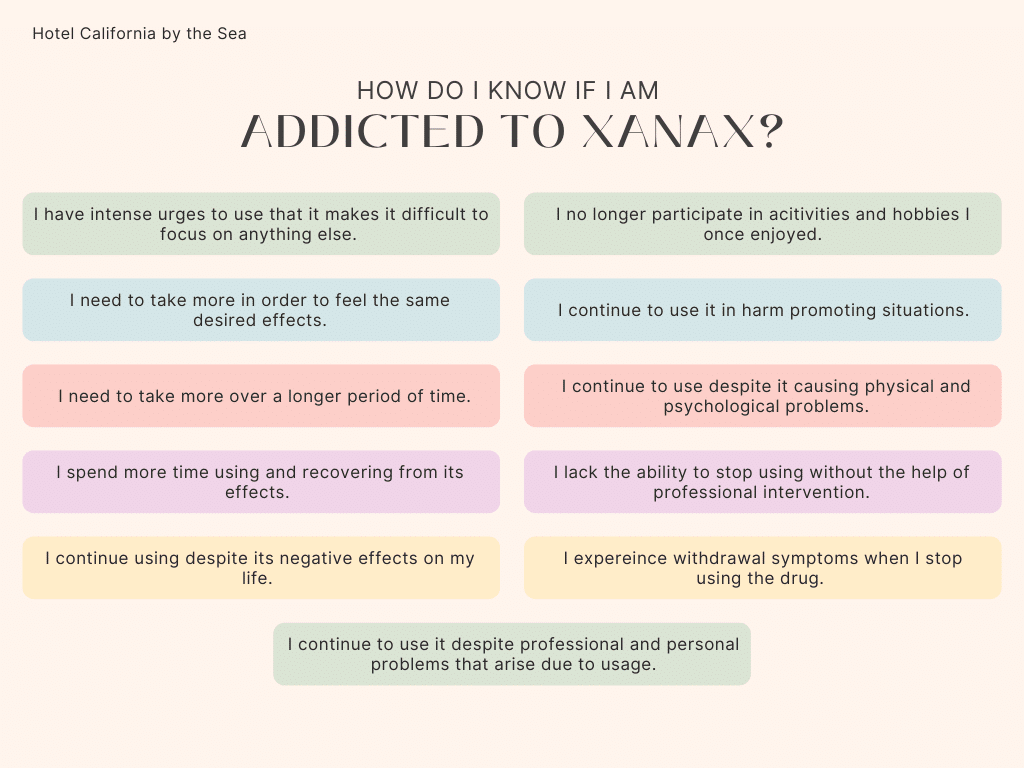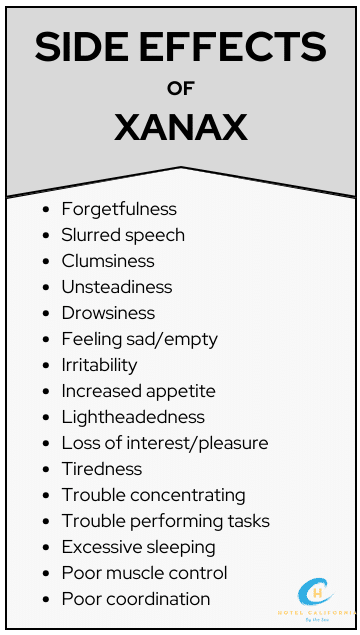Does Xanax cause weight gain?
Anxiety disorders are among the most common types of mental health illness that affect more than 40 million Americans. Because of that, antianxiety and antidepressant medications such as Xanax have become popular prescription medications. Xanax, also known by its generic name alprazolam, is a benzodiazepine and central nervous system depressant. Xanax works by reducing activity in the central nervous system, which can in turn interfere with normal brain functions such as sleep, appetite and weight gain and loss.

Though not a direct correlation or side effect of taking Xanax, weight changes are a common occurrence in those who take Xanax. In fact, many different factors contribute to a user experiencing weight loss and gain while on Xanax. Having an anxiety disorder significantly impacts a user’s weight.
What is anxiety and how is it treated?
Anxiety is described as being easily fatigued, having difficulty controlling feelings of worry, having difficulty concentrating, being irritable, feeling restless and having difficulty sleeping.
Experiencing anxiety is a normal part of life. Everyone experiences feelings of fear and apprehension throughout their lives. Anxiety disorders fall under a group of psychiatric disorders distinguished by constant feelings of intense fear and worry persisting without decreasing over time. Types of anxiety disorders include generalized anxiety disorder, panic disorder, phobia-related disorders and social anxiety disorder. As a way to cope, pharmacological treatments have been proven to be effective.
Antianxiety and antidepressant medications are divided into four main categories. Selective serotonin reuptake inhibitors (SSRIs) increase serotonin levels in the brain. Serotonin-norepinephrine reuptake inhibitors (SNRIs) increase both serotonin and norepinephrine in the brain. Tricyclic antidepressants (TCAs) increase serotonin, norepinephrine and dopamine in the brain. Monoamine oxidase inhibitors (MAOIs) increase serotonin, dopamine and norepinephrine in the brain.
All of these medications impact the hormone serotonin. Serotonin helps to regulate different areas of the brain including mood and appetite. When serotonin levels are manipulated through medications, it can produce varying results in weight gain and loss.

Does Xanax cause weight gain?
Xanax, a popular medication, is often prescribed to treat people who experience social anxiety disorder, phobias, separation anxiety disorder, medication-induced anxiety disorder, and generalized anxiety disorder. Xanax works by increasing the effects of chemicals in the brain called GABA to promote calmness and a sense of relaxation in the body. Ultimately, it reduces brain activity in the central nervous system. So how does Xanax cause weight gain or weight loss?
High doses of Xanax are associated with significant depressant side effects. In some extreme cases of abuse, users can develop or worsen feelings of depression and other mood changes. Oftentimes when a person experiences depressed feelings, they lack the motivation to do things and become less physically active and sedentary. The lack of movement can contribute to someone gaining weight while on Xanax,
Similarly, because Xanax is a depressant, it causes a decrease in energy levels. Low energy, tiredness and fatigue also lead to a lack of physical exercise and activity. This can also lead to weight gain.
Changes in appetite are another symptom of taking Xanax. The medication can cause both an increase or decrease in appetite depending on each user. In some cases, users experience a loss of appetite. Because of this, it can make a user feel like eating at odd times and in irregular amounts that do not agree with the body’s metabolism. It creates an inconsistency in the absorption or non-absorption of key nutrients. This can result in an unhealthy weight gain.
Changes in sleep patterns can indirectly cause weight gain. Xanax abuse can disrupt sleep patterns resulting in poor sleep, irregular sleep or adverse reactions of insomnia. Poor sleep is often associated with an increased appetite. An increased appetite often leads to an increase in weight gain. Poor sleep and irregular sleeping patterns disrupt the body’s circadian rhythm. When this is thrown off balance, it can also lead to changes in eating habits including an increase in appetite.
Long-term use of Xanax can cause a downregulation of serotonin receptors. This can cause cravings for carbohydrate-rich foods such as pasta, bread, and sweets. Carbs are sugars and consumption of excess sugar can lead to weight gain.

Other factors that can contribute to weight gain resulting from Xanax abuse
- Shifts in metabolic rate
- Fluctuation in energy levels
- Changes in body composition
- Cognitive impairment that leads to less self-discipline
- Impacts on the gastrointestinal systems
- Hormonal changes
- Social eating
- Taste alterations and heightened appetite changes
Check Your Insurance Coverage for FREE
Find out if your insurance covers addiction treatment in minutes. We accept most insurance!
Ways to help manage weight gain caused by Xanax
- Adjust Xanax dose. Speak with your physician about finding a dosage that will work better for every aspect of your life including sleep and appetite.
- Switch medications. Speak with your physician about possibly switching to a different medication that might have less side effects.
- Managing side effects. Work with your physician to learn how to best manage side effects that could impact what and how you eat.
- Long-term treatment assessment. Anxiety can be a lifelong diagnosis. Talk with your physician about effective long-term treatment plans and how that may affect other aspects of your life including weight gain and loss.
- Eating healthy. Create a healthy diet with whole foods, and limiting processed foods and added sugars. Clients can also seek out professional help from a nutritional counselor or dietitian.
- Stay active. Staying physically active and engaging in routine exercise can not only help minimize weight gain, but it can also improve mental health.
- Minimize stress. Stress can cause both physical and psychological disruptions to daily life. Practicing mindfulness, deep breathing and other forms of stress relief can help prevent unwanted weight gain. Managing stress can also help with disruptive sleep patterns. This will allow a person to get enough sleep. Which in turn can prevent weight changes.
- Behavioral therapy. Cognitive behavioral therapies can help clients learn to better manage stress, anxiety and triggers that lead to a disruption in the body’s normal functions and systems.
Reach out to Hotel California by the Sea
We specialize in treating addiction and other co-occurring disorders, such as PTSD. Our Admissions specialists are available to walk you through the best options for treating your addiction.
Treatment for Xanax abuse
There is no clear link between traditional anti-anxiety medications and weight gain. However, there are many factors associated with the symptoms of Xanax abuse that can cause weight changes. Symptoms can include changes in mood and behavior, fatigue and adverse sleep problems. Clinical trials suggest long-term use of Xanax leads to tolerance, dependence and addiction. At Hotel California by the Sea, we specialize in treating substance use disorders such as an addiction to benzodiazepines like Xanax.
Our behavioral health treatment program offers detox, residential and outpatient programs to clients in varying levels of care. We offer effective evidence-based treatments such as DBT, EMDR therapy and family therapy as part of the holistic treatment approach. When it comes to sobriety and recovery, patients must address all aspects of addiction. This includes physical, emotional, behavioral and psychological. Hotel California by the Sea understands that treatment is not a one-size-fits-all. All clients will receive individual treatment plans to help them overcome their addiction.
References:
https://www.ncbi.nlm.nih.gov/books/NBK538165/
https://montarebehavioralhealth.com/does-anti-anxiety-medication-cause-weight-gain/
https://www.health.harvard.edu/blog/managing-weight-gain-from-psychiatric-medications-202207182781
https://www.addictionresource.net/xanax/weight-gain/
https://www.choosingtherapy.com/does-xanax-cause-weight-gain/
https://www.rehabcenter.net/does-xanax-cause-weight-gain/
